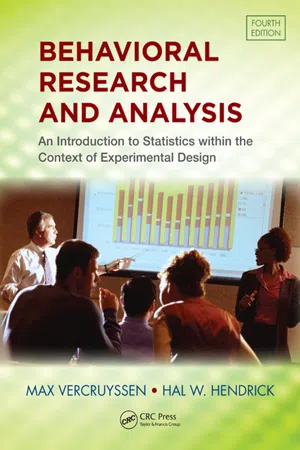Psychology
Planning and Conducting Research
Planning and conducting research in psychology involves the systematic process of defining research questions, selecting appropriate methods, and collecting and analyzing data to answer those questions. This process requires careful consideration of ethical guidelines, potential biases, and the reliability and validity of the research instruments used. Effective research planning is essential for producing meaningful and credible findings in psychology.
Written by Perlego with AI-assistance
Related key terms
1 of 5
7 Key excerpts on "Planning and Conducting Research"
- eBook - PDF
- Bernard C. Beins, Maureen A. McCarthy(Authors)
- 2017(Publication Date)
- Cambridge University Press(Publisher)
Once you decide on a research question, you need to fill in the details about how you will carry out your project. This aspect of your task is not necessarily difficult, but you need to consider carefully myriad details. These details are the subject of the rest of this book. Chapter 4 • Practical Issues in Planning Your Research 83 A research project can take many different paths; you have to decide how you want yours to proceed so that you arrive at the best answer to your question. Different Ways of Studying Behavior If your research is going to be data-driven, you have to measure something. After you decide the topic you want to study, one of the next steps is to figure out what you will be observing. Because psychologists study complex ideas that either may not be easy to measure or may have multiple measures, the issue of measurement is critical. Consider some ways that psychologists have studied creativity. Furnam and Nederstrom (2010) have investigated the correlation between creativity and personality among managers in the business world. Their measurement of creativity was through a test of divergent thinking, that is, a person’s ability think “outside the box.” In this research, the level of creativity was defined in terms of the number of outcomes that could result from situations that the researcher described to the participant. (The investigators found, among other things, that extraversion was associated with level of creativity.) In contrast, Langer, Pirson, and Delizonna (2010) examined whether people’s level of satisfaction regarding performance in a creative drawing task was affected by whether they compared their work to that of others. They measured creativity simply by asking their par- ticipants to rate their own performance on the drawing task. - eBook - PDF
Research in Psychology
Methods and Design
- Kerri A. Goodwin, C. James Goodwin(Authors)
- 2016(Publication Date)
- Wiley(Publisher)
60 3 Developing Ideas for Research in Psychology PREVIEW & CHAPTER OBJECTIVES All research begins with a good question, and this chapter is designed to help you develop such questions. It begins by distinguishing among various forms of research and elaborates on a concept introduced in Chapter 1—the empirical question. You will learn how research can develop from everyday observations of behavior, from theory, and from questions left unanswered by prior research. The chapter concludes with a brief description of PsycINFO, psychology’s premier information database, and advice about how to gather information for writing a literature review. When you finish this chapter, you should be able to: • Distinguish between and identify the value of both basic and applied research. • Distinguish between the laboratory and the field as the setting for research in psychology, and understand the advantages and disadvantages of each. • Distinguish between qualitative and quantitative methods, and understand how they often combine. • Be able to formulate a good empirical question. • Understand the need for operational definitions. • Understand how the use of several operational definitions for the same concept can strengthen conclusions about psychological phenomena (converging operations). • Describe examples of psychological research that have developed from everyday observations and from serendipitous events. • Describe the defining features of a theory in psychology and show how theories (a) lead to research in psychology; (b) are influenced by research outcomes; and (c) must be productive, parsimonious, and testable (i.e., capable of falsification). • Understand the importance of the “What’s next?” question and the value of research that simultaneously replicates and extends prior research. • Distinguish between two types of replication (direct and conceptual) and explain the importance of replication in psychological science. - eBook - PDF
Behavioral Research and Analysis
An Introduction to Statistics within the Context of Experimental Design, Fourth Edition
- Max Vercruyssen, Hal W. Hendrick(Authors)
- 2011(Publication Date)
- CRC Press(Publisher)
181 7 Planning, Conducting, and Reporting Research This final chapter was written to help readers plan research studies, avoid mistakes in the control of intervening variables, conduct experiments, and prepare research reports. For some this may involve thesis or dissertation research while for others it may involve development of guidelines for completing a term project to demonstrate the capability of completing a larger document. This chapter is about research communication. The topics presented are Planning and Conducting Study Techniques for Controlling Extraneous Variables Conducting Experiment Writing Research Report Summary Key Word Definitions References Exercises Exercise Answers KEY WORDS Abscissa Informed Consent Randomization Abstract Section Intervening Variable Reference Section Apparatus Introduction Section Results Section Balancing Latin Square Design Seriation Confounding Variable Main Heading Side Heading Control Group Method Section Subjects Counterbalancing Nuisance Variable Summary Section Design Ordinate Survey of Literature Discussion Section Paragraph Heading Table Extraneous Variable Problem Treatment of Data Figure Procedure PLANNING AND CONDUCTING STUDY S URVEYING L ITERATURE Beginning with a general idea of the problem or area you wish to investigate, the first step you, as a researcher, should undertake is to survey all the previous work that is relevant to your planned study. Undertaking a literature survey early in your planning will allow you to Clearly identify and formulate the specific problem to be studied — By reviewing the research of others (literature) you may gain knowledge of past discoveries, present posi-tions, and what next needs to be studied. In some cases, you may find that the necessary 182 Behavioral Research and Analysis studies already have been conducted and the information you need is readily available in the literature. - eBook - PDF
The Chicago Guide to Your Career in Science
A Toolkit for Students and Postdocs
- Victor A. Bloomfield, Esam E. El-Fakahany(Authors)
- 2008(Publication Date)
- University of Chicago Press(Publisher)
ii conducting and presenting research 10 the meaning and responsible conduct of research In this chapter we will discuss the meaning and broad social and ethical implications of research, issues that all beginning researchers should be aware of. What is research? It is interesting to consider some definitions and synonyms of “research,” which bring out the various implications of the term. Merriam-Webster’s Collegiate Dictionary defines research as “investigation or experimenta-tion aimed at the discovery and interpretation of facts, revision of accepted theories or laws in the light of new facts, or practical application of such new or revised theories of laws.” That’s a rather dry definition. Less formal, and perhaps getting closer to the psychology of researchers, is author Zora Neale Hurston’s statement “Research is formalized curiosity. It is poking and prying with a purpose.” And philosopher Jacob Bronowski writes, “That is the essence of science: ask an impertinent question, and you are on the way to a pertinent answer.” These two quotes capture the somewhat irrever-ent attitude that characterizes the best research. Again to quote Bronowski: “It is important that students bring a certain ragamuffin, barefoot irrever-ence to their studies; they are not here to worship what is known, but to question it.” “Research,” as a verb, has a lot of synonyms, each with a slightly differ-ent connotation: analyze (to break down into parts for study), examine (to scrutinize carefully or critically), explore (to probe in pursuit of discover-ies), interrogate (to question relentlessly), test (to engage in experiments). Indeed, different kinds of research, and the same project at different times, may entail hunting, surveying, dissecting, critiquing, and much more. Here’s one more word that characterizes both the outcome and the gen-esis of successful research, which is why those who have embarked on a research career remain so committed to it: inspiration. - eBook - PDF
Research Methods
A Tool for Life
- Bernard C. Beins(Author)
- 2017(Publication Date)
- Cambridge University Press(Publisher)
Consequently, you choose one and try to get the greatest amount of information from it. At this point, it should be clear why it is important that scientific research be pub- lic. If you read about an experimental study done in a lab, you might question whether the same behaviors would occur in a more realistic setting. You could take the idea and develop a similar approach in the workplace. Most likely, the managers of the work setting are not going to let you disrupt their business with experimental manipulations, so you have to rely on correlational approaches. In the end, two projects relate to a common ques- tion, each with a different methodology. We hope that both studies lead to similar conclusions. When they do, psychologists say that the research results have a type of validity called convergent validity. If not, we try to figure out why the two approaches led to different conclusions, which means doing more research. Because so many variables influence human behavior, we can be assured that each research project will provide only a small piece of the puzzle and that we will need many different projects and many different methodologies in order to assemble a complete picture of the behavior. PRACTICAL ISSUES IN PLANNING YOUR RESEARCH 113 If you use a jigsaw puzzle as an analogy to research, you might say that we have a puzzle consisting of a great number of pieces and that occasionally we find that some- body has thrown pieces from another puzzle into our box. We often don’t know that the odd piece has come from another puzzle until we spend a lot of time trying to make it fit. When we become aware that the stray piece belongs to a different puzzle, we toss it out. The good news is that we become aware of another interesting puzzle to work on later. SUMMARY Once you decide the general nature of your research question, you have to make a lot of practical decisions about how exactly to conduct your study. - eBook - PDF
- Aparna Raghvan(Author)
- 2023(Publication Date)
- Society Publishing(Publisher)
QUALITATIVE RESEARCH: PLANNING AND WRITING 5 CONTENTS 5.1. Introduction .................................................................................... 128 5.2. Research Paradigms ........................................................................ 130 5.3. Qualitative Research Methods in Psychology .................................. 134 5.4. Some of Main Qualitative Methods Used in Psychology ................. 138 5.5. Emergent Qualitative Methods ........................................................ 145 5.6. Planning Qualitative Research ........................................................ 145 5.7. The Qualitative Research Proposal .................................................. 153 5.8. Process of the Qualitative Proposal ................................................. 153 5.9. Conclusion ..................................................................................... 156 References ............................................................................................. 157 CHAPTER Qualitative Research Methods in Psychology 128 Planning and writing in the field of qualitative research plays a vital role. It should be really apt as well as meaningful in order to get perfect results or outcomes of the qualitative research. Thus, it is important to have key knowledge of planning and writing. The chapter initially talks about different research paradigms followed by the implementation of qualitative research methods. Later, some of the most important methods that are being used in planning qualitative research are discussed. Qualitative research proposal and the process of it are also explained towards the end of the chapter. 5.1. INTRODUCTION For many years, it was conventional to classify the act of conducting research alongside experiencing and thinking as the primary methods in which individuals attempted to comprehend their surroundings. - Lorelle J. Burton, Drew Westen, Robin M. Kowalski(Authors)
- 2022(Publication Date)
- Wiley(Publisher)
Pdf_Folio:227 CHAPTER 5 Research methods in psychology 227 • Two of the key ethical issues in psychological research include informed consent (the participant’s ability to agree or refuse to participate in a study) and deception (where participants are not informed of the aims of the investigation until the end of the study). 5.4 Outline the procedures for evaluating a study. • To evaluate an empirical or scientific psychological study, a critical reader should answer several broad questions: (1) Does the theory make sense, and do the hypotheses flow sensibly from it? (2) Is the sample adequate and appropriate? (3) Are the measures and procedures valid and reliable? (4) Are the data conclusive? (5) Are the broader conclusions warranted? (6) Does the study say anything meaningful? (7) Is the study ethical? • In qualitative research, consider the research questions being explored to determine if the approach taken is suitable. Choice of methodology will inform how the data collected will be analysed and interpreted. • Critical thinking requires you to identify arguments that are not based on the research evidence. Common fallacies in argu- ments include the straw man, appeals to popularity, appeals to authority and arguments directed to the person. • The ‘crisis of replicability’ in psychology refers to the difficulties researchers have in replicating the results of earlier research. An experiment or study is replicable if it can produce the same results when repeated. 5.5 Discuss the benefts and limitations of psychology research on the internet. • Internet technologies are impacting the way psychology research takes place. The benefits of using these technologies come from a capacity to access, automate and process data quickly and eas- ily. Potential downsides include sampling bias, uncontrolled data collection procedures, protecting the welfare of participants and ensuring participants’ right to confidentiality.
Index pages curate the most relevant extracts from our library of academic textbooks. They’ve been created using an in-house natural language model (NLM), each adding context and meaning to key research topics.






